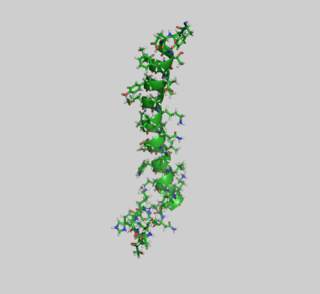 W
WCholecystokinin is a peptide hormone of the gastrointestinal system responsible for stimulating the digestion of fat and protein. Cholecystokinin, officially called pancreozymin, is synthesized and secreted by enteroendocrine cells in the duodenum, the first segment of the small intestine. Its presence causes the release of digestive enzymes and bile from the pancreas and gallbladder, respectively, and also acts as a hunger suppressant.
 W
WGastric inhibitory polypeptide (GIP), or gastric inhibitory peptide, also known as glucose-dependent insulinotropic polypeptide, is an inhibiting hormone of the secretin family of hormones. While it is weak inhibitor of gastric acid secretion, its main role is to stimulate insulin secretion.
 W
WIncretins are a group of metabolic hormones that stimulate a decrease in blood glucose levels. Incretins are released after eating and augment the secretion of insulin released from pancreatic beta cells of the islets of Langerhans by a blood glucose-dependent mechanism.
 W
WMotilin is a 22-amino acid polypeptide hormone in the motilin family that, in humans, is encoded by the MLN gene.
 W
WProkineticin is a secreted protein that potently contracts gastrointestinal smooth muscle.
 W
WSecretin is a hormone that regulates water homeostasis throughout the body and influences the environment of the duodenum by regulating secretions in the stomach, pancreas, and liver. It is a peptide hormone produced in the S cells of the duodenum, which are located in the intestinal glands. In humans, the secretin peptide is encoded by the SCT gene.
 W
WSecretin is a hormone that regulates water homeostasis throughout the body and influences the environment of the duodenum by regulating secretions in the stomach, pancreas, and liver. It is a peptide hormone produced in the S cells of the duodenum, which are located in the intestinal glands. In humans, the secretin peptide is encoded by the SCT gene.